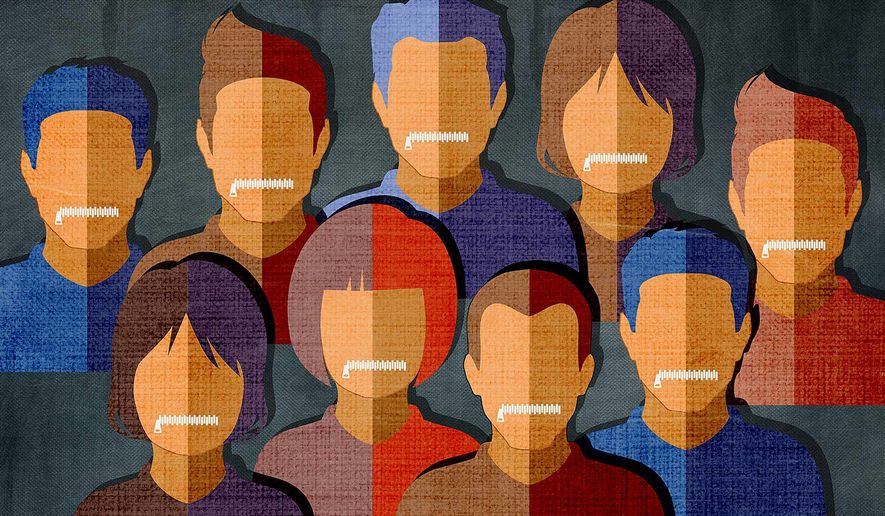
MODERATE VOICES MUFFLED
It’s true – I’m a member of the “Silent Majority Party”. My fellow members and I never demonstrate, wave placards, stage sit-ins or stir-up trouble. We are a quiet bunch with no media spokesperson. Although many of us are discontent with what is happening in society, we keep our opinions out of the public arena and quietly get on with our lives.
In my particular case, I express my views on contemporary issues via this blog, but that’s where I draw the line. Like my fellow Silent Majority Party brethren, I leave the shouting, heckling and disruption to the vocal minority. Their manipulative antics invariably capture the attention of the media, which provides prime-time coverage of their opinions – no matter how radical.
Non-peaceful protests, rallies and marches tend to attract more media attention than peaceful demonstrations. “A little violence goes a long way,” proclaims US political journalism company, Politico, because “the press loves the sound of breaking glass, police-car sirens and tear-gas grenades”. Such activities certainly trump inaudible forms of protest like letter writing.
Political activists take to the streets over a diverse range of issues, grievances and concerns. In addition to protest activities, organised interest groups lobby politicians, mobilise grass-roots action and orchestrate media campaigns to get their message across. Swaying public opinion and influencing policy outcomes is the name of the game.
A US study claims that small groups which reach a critical mass of 25 per cent, can overturn established norms. Decades of work in sociology, physics, and other disciplines have supported this idea. As noted in a newspaper article:
Small groups of people can indeed flip firmly established social conventions, as long as they reach a certain critical mass. When that happens, what was once acceptable can quickly become unacceptable, and vice versa. Two decades ago, most Americans opposed gay marriage, bans on public smoking and the legalization of marijuana; now, these issues all enjoy majority support.
While I’m a passionate advocate for freedom of expression and would never stop anyone from exercising their democratic right to protest, the reality is that moderate voices are stifled by the clamour of minority interest groups and individuals. As most citizens do not shout from the rooftops or force their beliefs and politics on to their fellow citizens, they are largely invisible.
According to the NSW Bar Association, freedom of speech is not an unfettered right to do and say what we want. “It is a personal right which, in any civilised society, carries with it, the corresponding duty to consider the rights of others. Freedom of speech is therefore a qualified right, not an absolute right, in accordance with international human rights law,” wrote the association.
Research shows that being confident and loud is one way to win an argument – even if you are wrong. Shout louder than anyone else and people will assume you’re right. In the world of politics, bolshie behaviour has been seen as the way to get ahead. Donald Trump shouted louder and more outrageously than any other politician and this enabled him to dominate the news.
Nigel Farage – who led the former pro-Brexit UK Independence Party (UKIP) – is also a loud, rabble-rousing politician. His bombastic style convinced many Britons that breaking away from the European Union would be a good thing. He cleverly harnessed the power of voter discontent and exploited the populaces’ deepest fears about immigration.
Farage used xenophobic language to spruik a racist message, which had his misguided followers chanting “we want our country back”. The UK is now suffering post-Brexit regret over its disastrous decision to leave the EU. In the words of former UK PM, Gordon Brown, Farage “highjacked patriotism” by manufacturing distrust and disunity.
I’ve long observed that loud and aggressive people tend to get their way – they won’t take “no” for an answer. They’re the ones who will not accept that the doctor is booked until next week, but argue their way into the surgery that same day. They’re the ones who become irked at airline cabin baggage restrictions and hog the overhead bin after airline staff relent in the interests of on-time departure.
These “entitled” individuals believe that the rules don’t apply to them and that they deserve preferential treatment. Meanwhile, the rest of us graciously accept that the doctor can’t see us today and that we need to stay within baggage allowance limits. So, should we all stomp our feet every time we are upset when things don’t go our way? I think not.
We should not go through life being hijacked by our anger. To lose your temper and yell is not a constructive way to deal with a difficult situation – it’s also damaging to relationships. Being calm and quiet, on the other hand, is not a bad thing. The world is full of quiet achievers. The best performing staff aren’t necessarily the most vocal. Nor are the most valuable customers necessarily the loudest ones.
In the same way, quieter citizens are not necessarily apathetic. Rather, they dislike the politics of confrontation and prefer to cast an informed vote at each election. Politics based on “he-who-shouts-loudest” often comes unstuck where it matters most – in the privacy of the polling booth.
Democracy gives each of us an equal say because of the principle of one-person, one-vote. Each person who casts a vote is equal to every other voter – no matter how much noise an individual may make. I care deeply about our nation and am an avid follower of the political system. This enables me to cast an informed vote for the party with the policies that I believe will serve our nation best.
In fairness, I must acknowledge that the electoral process is far from perfect. We like to believe that voters evaluate the evidence put in front of them over the course of a campaign and then make an informed decision at the ballot box. This, however, is fantasy as research shows that the average voter is surprisingly unsophisticated. Most citizens don’t make their voting decisions based on policy questions. Voters are poorly informed and make irrational decisions.
On the plus side, Australia’s compulsory system saved us from Trumpism. As pointed out in an article in the Australian edition of The Guardian, Donald Trump was elected with only a quarter of eligible voters supporting him, and just 37 per cent of eligible Britons voted to leave the European Union. In 2015, (then) US president Barack Obama praised Australia’s system, saying it would be “transformative” if everyone voted in the United States.
Notwithstanding my personal preference to voice my concerns in the privacy of a polling booth rather than publicly on the street, I accept wholeheartedly that political activism is part and parcel of a free and open society. Let those who wish to demonstrate without violence, do so.
But let’s not criticise those who choose a less vocal way of expressing their views.
Regards
Paul J. Thomas
Chief Executive Officer
Ductus Consulting


One of your best, Paul … Great Blog.
Hello Paul,
A very enjoyable piece of writing……thank you!
The article is a fascinating overview of that particular aspect of the human condition.
Scary with its sociological accuracy!
Many Thanks,
Des
Thanks Paul, good work as usual. I’ve always disliked noisy aggressive people that need to raise their voice to get their point across. Today I tend to treat them with sarcasm, such as ”tell some that cares” or ”Is that the best you’ve got”. I think we all should get together majority and minority and protest against global inhumanity.